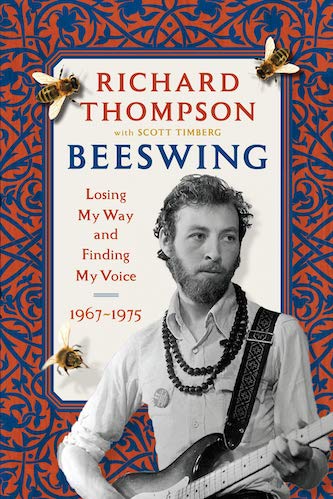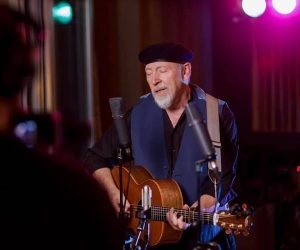Book Review: “Beeswing” — Richard Thompson Loses His Way and Finds His Voice
By Chelsea Spear
Richard Thompson’s memoir displays flashes of his writerly talents, but the volume feels a bit less immediate than one might hope.
Beeswing: Losing My Way and Finding My Voice—1967-1975 by Richard Thompson. Algonquin Books, 304 pages, $24.95
Editor’s Note: Arts Fuse interview with Richard Thompson

Over the past half-century, Richard Thompson has made a name for himself as a guitar god’s guitar god, a songwriter par excellence, and a reliable, excellent live act. The five records he co-wrote and recorded with the British band Fairport Convention innovated the folk tradition with their expansive arrangements of traditional songs like “Reynardine” and “Tam Lin,” and his later albums with then-wife Linda and as a solo act have showcased his nimble skills as lead guitarist and songwriter. With Thompson’s observational skill and eye for detail as a lyricist — not to mention the rapier wit he draws on for his between-song patter — a memoir of his early days seems like it would be a compulsively readable volume. Beeswing: Losing My Way and Finding My Voice—1967-1975 has flashes of his writerly talents, but feels a bit less immediate than one might hope.
Thompson addresses this sense of distance in the first lines of the book. “It’s thickest here, in my memory,” he writes at the beginning of the first chapter. “When was the last time I dared look? I don’t want to remember, but now it is time to think back.” Whether this arm’s-length perspective is borne of a faulty memory or from a sense of obligation is hard to tell. Beeswing unfolds like a detailed timeline of his musical output that not only includes the titles of albums and names of his collaborators but also the (presumably long-deceased) producers and engineers who recorded the albums.
Some insights into songwriting and recording slip through the fog of distance. Anecdotes about events in his life that directly inspired songs made their way into chapters. The encounter that inspired “Broken Doll,” in which Thompson crossed paths with a young mentally ill fan, is both scary and deeply poignant. “It haunted me that she seemed so unbroken on the surface, but was so damaged underneath,” he recalled of the meeting. As the book draws to a close, with Richard and Linda in domestic contentment, Thompson provides a close reading of his song “Beeswing” to reveal aspects of his songwriting process. His initial spatial metaphor for describing how the song was created — “It was like being seven years old again, placing one foot in front of the other, step by step, with my head in thick fog, unable to see my hand in front of me, not too concerned if I found my way to school or not” — gives way to lengthy quotes from Beethoven and Robert Burns and the observation that “those who claim to understand the creative process are usually uttering bullshit of the first magnitude.”
Many rock fans look at the early 1970s as a high water mark for adventurous popular music, and Thompson is happy to indulge these worshipful readers. He includes passing accounts of jamming with Led Zeppelin and Jimi Hendrix, hanging out with Linda Ronstadt and Phil Ochs, and seeing John Lee Hooker and Van Dyke Parks live. However, he’s also willing to show a bit of the dark side, where the record industry cut corners and cheated the artists. On Fairport’s first visit to America, their label “provided two limousines to greet us at the airport. This was the life! It was only several years later that we noticed every possible expense had been added to our bill, to be deducted from our earnings — even the times when they were clearly taking us out to dinner.” The band fares a little better with their British management, Witchseason, taking advantage of their lax bookkeeping to get booked into four-star hotels for European tours.

Richard Thompson today. Photo: Facebook
Thompson’s straightforward, noncombative approach means that he will only go so far to shade some of his former collaborators. His respect for his cohort gives the book a refreshing tone. He describes Sandy Denny’s shortcomings in some detail, recalling her poor body image and her frequent drinking, but he also observes that “she was the greatest singer in Britain, and we would be unwise to lose her.” Similarly, his first wife Linda is a peripheral figure in Beeswing, but the book’s elliptical ending suggests that there might be a second volume to come on the tumultuous Shoot Out the Lights era.
Fans of the ’70s folk scene in general and Richard Thompson and Fairport Convention in particular will appreciate Beeswing, if only because of its insights into the London and Los Angeles folk rock scenes. They will no doubt appreciate the names and locales of studios where classic albums were recorded. Those with less of a frame of reference (or built-up passion) would be wise to read a more general volume about the era’s music and musicians — such as Joe Boyd’s memoir White Bicycle — instead of a remembrance aimed at a niche audience.
Chelsea Spear has written for the Brattle Theatre’s Film Notes blog, the Gay & Lesbian Review, and Crooked Marquee. She lives in Boston.

Beeswing is the name of a tiny village in Dumfriesshire, a few miles from the home of Richard Thompson’s grandparents and would possibly have become known to him during family holidays in the area. The village was formerly known as Lochend in reference to its proximity to Loch Arthur which has been claimed as the setting for the Arthurian story of ‘The Lady Of The Lake’. The village was renamed in honour of the famous racing mare, Beeswing.